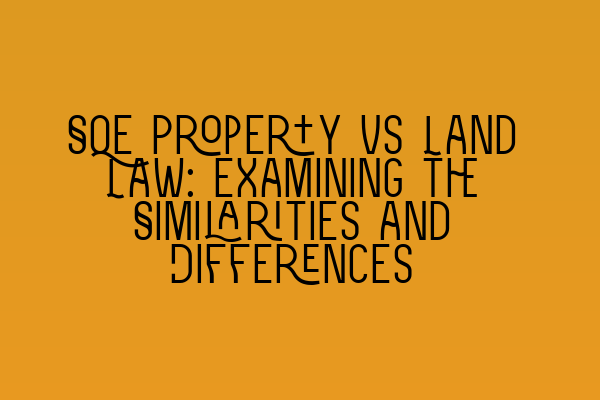Are you considering a career in property law or land law? Perhaps you have already started your studies and are curious about the similarities and differences between these two areas of law. Look no further, as we break down the key points of SQE Property Law and Land Law for you in this informative blog post.
Before we dive into the specifics, it’s worth noting that both property law and land law are integral parts of the SQE (Solicitors Qualifying Examination) curriculum. The SQE serves as a standardized assessment for aspiring solicitors in England and Wales, and it consists of different sections covering various areas of law, including property law and land law.
Now, let’s explore the similarities between property law and land law. Both areas of law deal with the legal concepts and regulations surrounding real estate, whether it be residential or commercial property. They encompass the rights and responsibilities of property owners, tenants, and other parties involved in property transactions.
One of the key similarities is the focus on property rights. Whether in property law or land law, understanding the legal framework that governs property rights is essential. This includes the concept of ownership, the transfer of property, and the creation of legal interests in land. It is crucial for solicitors practicing in these areas to have a solid grasp of the legislation and case law that underpins property rights.
Another shared aspect is the importance of contracts. Property transactions often involve contractual agreements between buyers and sellers, landlords and tenants, and other parties. A strong understanding of contract law is therefore essential for solicitors practicing in both property law and land law.
If you want to delve deeper into contract law or better understand its connection to property law and land law, you may find our related article on “SQE Contract Law: Analyzing Landmark Cases and Influential Judicial Decisions” useful.
Now, let’s turn our attention to the differences between property law and land law. While the two areas overlap in many aspects, there are distinct differences that set them apart.
Property law focuses on the broad scope of real estate and covers various types of property, including land, buildings, and other tangible assets. It encompasses both residential and commercial property, as well as intellectual property rights related to intangible assets.
Land law, on the other hand, specifically deals with the legal principles and regulations surrounding the ownership, use, and transfer of land. It delves into concepts such as freehold, leasehold, easements, covenants, and licenses. Understanding these concepts is crucial for solicitors practicing in land law, as they form the basis for advising clients on land-related matters.
To better comprehend the intricacies of contractual agreements in property law and land law, having a solid understanding of contractual capacity is vital. Our related article on “Understanding Contractual Capacity: Rights and Limitations” provides valuable insights into this topic.
Moreover, if you want to test your knowledge and assess your understanding of contract law, we recommend checking out our interactive SQE mock tests in “Interactive SQE Mock Tests for Contract Law: Test Your Knowledge.”
At SQE Property Law & Land Law, we understand the importance of staying up-to-date with the latest legal developments and practices. That’s why we offer a range of webinars on SQE Contract Law, providing expert insights and guidance to help you excel in your studies and career. Join our SQE Contract Law webinars and get the edge you need. Find out more in our related article on “Join Our SQE Contract Law Webinars: Expert Insights and Guidance.”
To prepare effectively for the SQE, you need to master the essentials of contract law. Our comprehensive SQE prep course will equip you with the knowledge and skills required to excel in this subject. Discover more about our SQE Prep course on “SQE Prep: Mastering the Essentials of Contract Law” to boost your chances of success in the examination.
In conclusion, while property law and land law have similarities, such as their focus on property rights and contracts, they also have distinct differences. Property law covers a broad spectrum of real estate, while land law specifically deals with the legal principles surrounding the ownership and use of land. Understanding these similarities and differences will enhance your knowledge and skills as a solicitor.
We hope this blog post has shed light on the fascinating world of SQE Property Law and Land Law. If you have any further questions or would like to explore these subjects in more detail, please do not hesitate to contact us. At SQE Property Law & Land Law, we are dedicated to supporting you on your journey towards becoming a successful solicitor.
